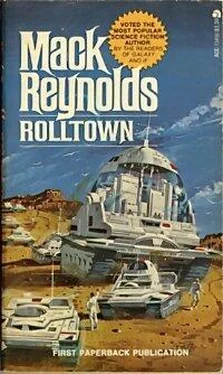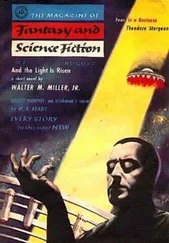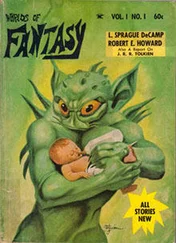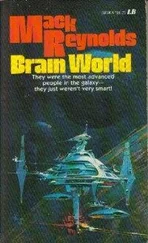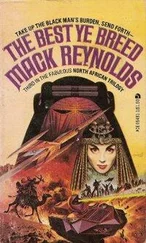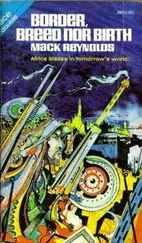Mack Reynolds - Rolltown
Здесь есть возможность читать онлайн «Mack Reynolds - Rolltown» весь текст электронной книги совершенно бесплатно (целиком полную версию без сокращений). В некоторых случаях можно слушать аудио, скачать через торрент в формате fb2 и присутствует краткое содержание. Год выпуска: 1976, Издательство: Ace Books, Жанр: Фантастика и фэнтези, на английском языке. Описание произведения, (предисловие) а так же отзывы посетителей доступны на портале библиотеки ЛибКат.
- Название:Rolltown
- Автор:
- Издательство:Ace Books
- Жанр:
- Год:1976
- ISBN:нет данных
- Рейтинг книги:4 / 5. Голосов: 1
-
Избранное:Добавить в избранное
- Отзывы:
-
Ваша оценка:
- 80
- 1
- 2
- 3
- 4
- 5
Rolltown: краткое содержание, описание и аннотация
Предлагаем к чтению аннотацию, описание, краткое содержание или предисловие (зависит от того, что написал сам автор книги «Rolltown»). Если вы не нашли необходимую информацию о книге — напишите в комментариях, мы постараемся отыскать её.
magazine in Jul and Sep 1969 issues under the title “The Towns Must Roll”.
Rolltown — читать онлайн бесплатно полную книгу (весь текст) целиком
Ниже представлен текст книги, разбитый по страницам. Система сохранения места последней прочитанной страницы, позволяет с удобством читать онлайн бесплатно книгу «Rolltown», без необходимости каждый раз заново искать на чём Вы остановились. Поставьте закладку, и сможете в любой момент перейти на страницу, на которой закончили чтение.
Интервал:
Закладка:
Bat thought about it, or at least pretended to. He already knew the answer.
He said slowly, “I’m not a loafer by nature. Besides, I feel a need to identify, I suppose you’d call it. Be part of the community.” He added, “I want to do my share…”
“You do more than your share,” she said in an unwontedly soft voice.
“…carry my part of the load,” he finished. He thought some more. “I’m a cop, for free. Some of the others who don’t spend full time at their art act in helping on repairs, as car mechanics, electricians, tinkerers, teachers or whatever. For instance, why do you teach art classes to the kids three times a week?”
“Touché,” she snorted. “But what I meant was, if you’re ambitious to work, don’t want to be a loafer as you called it, why do you stay in a community like this? Why the hell not get yourself a job up in the States?”
“Hiiii,” he sighed. “Haven’t you heard of the Meritocracy?”
“Come again?”
“Di, old girl, we have a new socio-economic system in our America. Symbols die hard, labels die hard, but today such labels as democracy, capitalism, free enterprise and such are passé. We have Meritocracy. It’s a term that came in back in the 1950s or 1960s I think and it was starting even then.”
“All right,” she told him. “Drop the other shoe. So what’s Meritocracy?”
“Well, back when the United States was first formed, about 80 percent of the population was involved in agriculture, most of the rest in the other primary occupations such as fishing, forestry, hunting and mining. At that point, only a few were in secondary occupations concerned with processing the products of a primary occupation. Practically none were in tertiary occupations which render services to primary and secondary fields. Came the industrial revolution, however, and the secondary occupations overtook the primary and by the middle of the 20th century or so only five percent of the population was needed in agriculture and tertiary workers were growing rapidly in number. With the second industrial revolution, call it automation or the computer economy if you will, even the secondary occupations began to fall off. The blue collar worker gave way to the white collar employee. Even on the farm the technician took the place of the illiterate behind the plow, the mechanical cotton pickers the place of the darky plodding down the endless cotton rows dragging his sack.
“But still that wasn’t the end. The quaternary occupations began to take precedence; occupations that render services to tertiary occupations or to each other. They are heavily concentrated among agencies of government, the professions, the arts, the nonprofit groups and the like. And along in here came the Meritocracy with the amalgamation of practically all information possessed by the human race into the National Data Banks of the computerized world.”
He took a deep breath. “Because, Di, old girl, in those data banks is all the information obtainable about all of our people; all the dope that used to be involved in the census reports, the tax records, the Social Security records, your educational standing, your military record, your medical records, your employment records and so forth and so on, but above all your I.Q.”
Di said, scowling at his bitter tone, “I seem to have missed a curve there.”
“No. At the same time Meritocracy took over, the full impact of automation hit us. It hadn’t been so bad when it struck the primary occupations, although one devil of a lot of the rural population were forced into the cities to try and find work, or, if not, relief. But by this time both the secondary and primary occupations were on the skids, numerically speaking. Five percent of our population could operate our farms and farm them more profitably than they had ever been farmed before. A fraction of the working force would operate the mines and mills, the factories and other industries. But when the automation hit the tertiary occupations, then, of a sudden, the majority of the population became occupationally displaced. It had come to the point where sales and services were employing the majority. Overnight, comparatively, that changed. The old system of bringing the product to the consumer was antiquated as was no other branch of our socio-economic system. Hundreds of thousands of individually operated stores, dispensing the same products, had been the past. Hundreds of thousands of repairmen, servicemen, tinkerers, had been involved in keeping our gadgets in repair.
“Very well. The ultra-market finished off the small shopkeepers in much the same manner that agricultural automation finished off the small farmer. And automation also finished off the small repairman when it became cheaper to throw away a mixer, a refrigeration power unit, or even a TV set or the replaceable engine of a car than it was to repair it.”
Di said in impatience, “What’s all this got to do with your Meritocracy?”
“Just this. The majority of our population became unneeded in our socio-economic system. What John Kenneth Galbraith, the old economist, once called the Technostructure, in short, management, became for all practical purposes all of the working population. Practically everybody who worked was part of management; from scientists, through engineers to technicians. The blue collar worker was an anachronism. Happily#longdash#I guess#longdash#by this time production was at such a scale that the unneeded were not forced into starvation. Simultaneously with the advent of Meritocracy came the movement toward Guaranteed Annual Income, the Negative Income Tax and other floors beneath the income of every family in the country, employed usefully or not. In short, the dole.”
Diana Sward said, “Goddammit to hell, stop lecturing me largely about things I already know. What’s this got to do with you not being a loafer, not going up and getting yourself a job?”
He said bitterly, “There’s not enough work to go around, Di. And that which is available requires both I.Q. and education. You need both. I.Q. without education is, of course, worthless, but you need the I.Q. to get the education, in the schools that count, at least. I’ve never seen figures but I suspect that the average person who works today in American industry has an I.Q. of something like 130. The number that have an I.Q. of a hundred or less must be infinitesimal.
“Di, when you apply for a position with any corporation in the nation, the first thing they do is check your dossier in the National Data Banks. And shortly after your name and identity number is your good old Intelligence Quotient, which they have been testing periodically ever since you entered kindergarten. Di, half the population of the United States is below average, that is, half have I.Q.s of less than 100. When a fraction of the population can hold down all the jobs needed, why should any corporation in its right mind hire somebody with an I.Q. of less than 100?”
“What in the name of Good Jesus has that got to do with you?”
“I’ve got an I.Q. of 93, Di.”
IV
She stared at him. “Don’t be ridiculous. Why, you’ve been lecturing me like a professor of economics for the past twenty minutes.”
He made a face. “Don’t confuse learning with intelligence, Di. I didn’t have much formal schooling. In fact, practically none at all. When I was a kid we still had the ghettos and slums and my family was as lower class as you could get. But during the Asian War I copped one and was in the hospital for quite a spell. I learned to read there. No, I mean literally. Before that I couldn’t do much more than read comic books and sign my own name. But I learned to read. You know the first book I read? The Bible, of all things. It made an agnostic out of me but it also goosed my intellectual curiosity.” He twisted his worried face into self-deprecation again. “Such as I’m capable of.”
Читать дальшеИнтервал:
Закладка:
Похожие книги на «Rolltown»
Представляем Вашему вниманию похожие книги на «Rolltown» списком для выбора. Мы отобрали схожую по названию и смыслу литературу в надежде предоставить читателям больше вариантов отыскать новые, интересные, ещё непрочитанные произведения.
Обсуждение, отзывы о книге «Rolltown» и просто собственные мнения читателей. Оставьте ваши комментарии, напишите, что Вы думаете о произведении, его смысле или главных героях. Укажите что конкретно понравилось, а что нет, и почему Вы так считаете.
